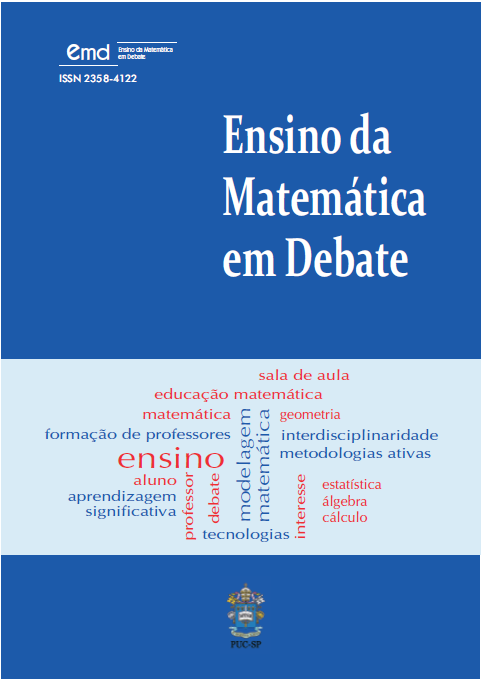Indigenous mathematical knowledge in the context of the Parkatêjê community: meanings of capitalist expansion in the Amazon region post-1970
Keywords:
Parkatêjê Community, Indigenous mathematical knowledge, Capitalist expansion, Amazon regionAbstract
This article has as its central focus the mathematical knowledge intertwined in bodily practices in different daily contexts of the Parkatêjê community, located in the Eastern Amazon, in the southeast of Pará. In this study, we seek to reflect on the meanings of capitalist expansion in the post-1970 Amazon region, in the implementation of new mathematical knowledge developed in the cultural context of this community; and identify indigenous mathematical knowledge woven over time, through their experiences and memories. To this end, this qualitative research uses the following methodological instruments for the production and analysis of research data: participant observation, interviews, oral narratives and reports from the elders of the Parkatêjê community. It is a study that has culture and education as its axis of analysis, based on mathematical practices experienced in the daily life of this society, developed at the State Indigenous School “Peptykre Parkatêjê”, with the participation of indigenous students from Early Childhood Education, Teaching Elementary and Secondary Education In the oral narratives and reports of the “old men” and “old women” of the Parkatêjê community, various concepts, contents and mathematical procedures can be seen, such as notions of space, measures of time, measures of capacity, strength, numbers, geometry, among others. The research findings highlight the importance of valuing indigenous knowledge in mathematical practices experienced in Indigenous School Education, intensifying the interculturality of the different knowledge of the Parkatêjê community.
References
ALRØ, Helle; SKOVSMOSE, Ole. Diálogo e aprendizagem em educação
matemática. Tradução: Orlando de Andrade Figueiredo. Belo Horizonte: Autêntica,
ARAÚJO, Leopoldina Maria Souza de. Parkatêjê x Português: caminhos de resistência. In: CONGRESSO INTERNACIONAL DA “BRAZILIAN STUDIES ASSOCIATION”, 9., 2008, Campus da Tulane University em New Orleans, Louisiana, Estados Unidos. Anais eletrônicos [...]. Estados Unidos: Campus da Tulane University em New Orleans, Louisiana, 2008. Disponível em: www.brasa.org. Acesso em: 23 abr. 2022.
BENJAMIN. Walter. Magia e técnica, arte e política. Ensaios sobre literatura e história da cultura. Tradução: Sergio Paulo Rouanet. Prefácio: Janne Marie Gagnebin. 7. ed. São Paulo: Brasiliense, 1994.
BRASIL. Constituição da República Federativa do Brasil. Brasília, DF: Centro Gráfico, 1988. Disponível em: http://www.planalto.gov.br/ccivil_03/constituicao/constituicao.htm. Acesso em: 26 abr. 2020.
CABRAL, Mauricio Martins; SANTOS FILHO, Alexandre Silva dos. Cultura e educação na Amazônia Oriental: práticas corporais na comunidade Parkatêjê. Revista Educação, Artes e Inclusão, Florianópolis, v. 13, n. 2, p. 8-32, maio/ago. 2017. Disponível em: https://revistas.udesc.br/index.php/arteinclusao/article/view/9017. Acesso em: 15 nov. 2017.
CABRAL, Mauricio Martins. Cultura e educação na Amazônia Oriental: sentidos e significados das práticas corporais na comunidade Parkatêjê. 2018. Dissertação (Mestrado em Dinâmicas Territoriais e Sociedade na Amazônia) – Universidade Federal do Sul e Sudeste do Pará, Marabá, 2018.
D’AMBROSIO, Ubiratan. Etnomatemática: elo entre as tradições e a modernidade. 2. ed. Belo Horizonte: Autêntica, 2002.
DOMITE, Maria do Carmo Santos; POHL, Robert Dobereiner; CARVALHO, Valéria de. Joint contributions of mathematics teacher educators and indigenous Terena teachers to revitalization of the native language. Revista Internacional de Educación para la Justicia Social (RIEJS), v. 3, n. 1, p. 121-131, 2014. Disponível em: https://revistas.uam.es/riejs/article/view/359/299. Acesso em: 14 mar. 2023.
MACHADO, Nilson José. Matemática e Língua Materna: análise de uma impregnação mútua. 5. ed. São Paulo: Cortez, 2001.
MAUSS, Marcel. Sociologia e antropologia. São Paulo: Cosac Naify, 2003.
MERLEAU-PONTY, Maurice. Fenomenologia da percepção. Tradução: Carlos Alberto Ribeiro de Moura. São Paulo: Martins Fontes, 1999.
ROSA, Milton; OREY, Daniel Clark. Considerations about ethnomathematics, the culturally relevant pedagogy and social justice in mathematical education. Educação Matemática Pesquisa, São Paulo, v. 25, n. 2, p. 145-165, 2023. Disponível em: https://revistas.pucsp.br/index.php/emp/article/view/61379. Acesso em: 24 set. 2023.
SANTOS, Jonatha Daniel dos. Etnomatemática e Povos indígenas de Rondônia: processos de mecanismo de controle e contraconduta. Perspectivas da Educação Matemática, v. 11, n. 25, p. 74-92, 2018. Disponível em:
https://periodicos.ufms.br/index.php/pedmat/article/view/3490. Acesso em: 11 out. 2022.
SILVA, Maria de Nazaré Moraes da; FERREIRA-SILVA, Marília de Nazaré; MAGNO E SILVA, Walkyria Passos. Autonomia Parkatêjê para preservar sua língua nativa: me Ikwy Tekjê Ri. Educação & Sociedade, Campinas, v. 38, n. 140, p. 809-825, jul./set., 2017. Disponível em: https://www.scielo.br/j/es/a/ZhkCrCXPr36tBz8KjRwTdfP/abstract/?lang=pt. Acesso em: 23 ago. 2023.
SOUZA, Elizeu Clementino de; CRUZ, Núbia da Silva. Pesquisa (auto)biográfica: sentidos e implicações para o campo educacional. In: AMADO, João; CRUSOÉ, Nilma Margarida de Castro (org.). Referenciais teóricos e metodológicos de investigação em educação e ciências sociais. Vitória da Conquista: Edições UESB, 2017. p. 167-194.
TOMAZ, Vanessa Sena; KNIJNIK, Gelsa. Tensionamentos na formação intercultural de professores indígenas: um estudo da escola Xakriabá. Educação em Revista, Belo Horizonte, v. 34, e187725, p. 1-27, 2018. Disponível em: https://www.scielo.br/j/edur/a/9YyjTFczHm7R96TxkLF4K8r/. Acesso em: 23 jun. 2023.
VIANNA, Heraldo Marelim. Pesquisa em educação: a observação. Brasília: Liber Livro, 2007.
Downloads
Published
How to Cite
Issue
Section
License
Copyright (c) 2024 Ensino da Matemática em Debate

This work is licensed under a Creative Commons Attribution-NonCommercial 4.0 International License.

Este obra está licenciado com uma Licença Creative Commons Atribuição 4.0 Internacional.





